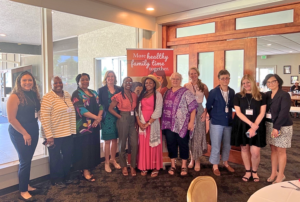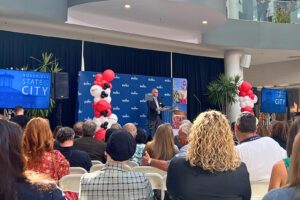Building relationships with residents, the city, and multisector partners to impact healthy neighborhoods.
by Debra Oto-Kent, MPH

The city of Roseville, located about 25 miles east of Sacramento, California, is a mid-sized city, engaged with the Invest Health initiative since 2016. Home to the largest railyard west of the Mississippi, Roseville’s Invest Health team focused on neighborhood conditions connected to the railyard—Roseville’s oldest communities.
Understanding the power of resident engagement, building strong multi-sector partnerships, and using local data to catalyze public and private funding to change neighborhood conditions were key focus areas that have led to building public and political will around our team’s priorities. The Roseville Invest Health story continues to evolve, but one thing is clear – the committed multi-sector team has laid the groundwork for success, and it’s paying off.
Invest Health Roseville Approach
In 2016, Roseville formed a multi-sector team to participate and travel to the first Invest Health convening led by Reinvestment Fund and with support from the Robert Wood Johnson Foundation (RWJF). We formed a ‘travel team’ composed of representatives from city staff and elected officials, residents, businesses, and health care, and a non-profit, the Health Education Council, serving as the ‘backbone’. Over the next six years, the travel team attended Invest Health convenings and deepened our collective understanding of health and racial inequities, the underlying drivers of health outcomes, community development systems and financing, and local political, demographic, and relationship dynamics.
Our travel team was tethered to Roseville’s community by the formation of a ‘home’ advisory committee that could implement what was learned afield. Our ‘home’ advisory committee is composed of 15-20 non-profit organizations, city departments, school representatives, and residents. Together, the committee would guide, inform, coordinate, and mobilize local assets. Today, Invest Health Roseville’s advisory committee and core travel team continue to convene monthly.
Collaboration as foundation
Building a strong relationship with the city of Roseville staff and elected officials was an approach that was implemented early in the Roseville Invest Health initiative. Several strategies helped build and make this relationship successful, including:
- A designated city staff representative on the Invest Health ‘travel team’ who reports to a Deputy City Manager
- Elected officials who agreed to be part of the core team (and continue their engagement)
- Aligning the goals of Invest Health with the City Council’s annually established strategic goals and regularly reviewing this alignment.
The alignment of Invest Health and city strategic priorities was especially impactful and allowed the team’s goals to gain momentum from each other. The shared priorities included:
- Resident engagement and increasing participation in neighborhood associations.
- Reviewing and considering Inclusive City Policies through the possible participation in the Government Alliance on Race and Equity Program.
- Increasing Pedestrian Connectivity.
- Revitalization of the downtown core and neighborhoods.
Although Invest Health Roseville’s priorities had already been focused on health equity and community development investments, the team’s initial work of making intentional connections between city goals and Invest Health goals created a synergy that expanded.

The Mayor of the City of Roseville mentioning the importance of partnering with Invest Health.
Focusing on resident priorities
Roseville’s original Invest Health application relied heavily on ‘data’ from state, local, and community health needs assessments (CHNA). These assessments revealed that the core neighborhoods were designated a ‘food desert’ with limited access to healthy foods. Additionally, the area had documented higher rates of chronic disease, asthma, and other risk factors. Initially, we thought that our work would focus on increasing access to healthy food, bringing in financing and relationships for a full-service grocery store.
Early in Invest Health, our team wanted to ensure that the data from the CHNA aligned with resident priorities and the potential solutions they would determine. After listening sessions, outreach, meetings, and individual discussions, we found that access to healthy foods was not residents’ highest priority. Instead, the neighborhood’s priorities included:
- Increasing safety and walkability;
- Reducing crime;
- Improving social connection to mental health, primary care, social services, neighbors, and government;
- Increasing physical activity and healthy food access.
Many of the priorities outlined were overlooked in our initial application. For example, one resident stated: “We can walk to the closest store, as we take our rolling baskets and strollers, what we need is curb cuts.”
With this resident guidance and a focus on incremental solutions, our Invest Health team pivoted to expand the single focus from healthy food to encompass the range of resident priorities.
Solutions and alignment of funding
As our team reviewed resident listening session data, it became clear that many of the priorities identified by residents had funding sources we could readily tap into in order to implement resident solutions. For example, the city had existing community development block grant funds that funded curb cuts in sidewalks identified by residents. In another example, a lack of lighting contributing to poor visibility on streets and at the local park was overcome through funding from Roseville Electric who had planned to retrofit existing lights with higher efficiency LED lights. Our team helped reroute funding to places with deep impact by spotlighting and centering the voices and needs of residents. The city of Roseville’s inclusion in Invest Health set the foundation for incremental private and public investments through grants, donations, sponsorship of events, programs, public sidewalks, lighting, and renovation funding.
Our Invest Health team also began to focus on Weber Park, one of the oldest parks in the city that was deemed unsafe, unattractive, and underutilized by residents. In 2022, the Council voted to invest in re-imagining Weber Park based on resident vision and input as well as renovate the neighboring 100-year-old Johnson swimming pool with a $9,400,000 City investment.
Invest Health’s experience of responding to residents’ needs is helping to guide this development. The city expanded standard resident input approaches to re-imagine Weber Park to include outreach and sessions in Spanish, additional workshops held at different times, door-to-door distribution of materials to gather input, and active and longer-term engagement of Neighborhood Association members to ensure continuous engagement. The current re-imagined park renderings include leveling the park to change the topography; enabling a larger seating area, play area, and accessibility.
Since Invest Health’s inception, our team has recorded the investments we secured from public and private sources to fund the resident-identified needs and solutions. To date, the original $60,000 grant made through Reinvestment Fund, with support from RWJF, has been leveraged to over $11,596,334 million in investments. This includes nearly $2,000,000 in private funds for resident-identified needs like signs for a neighborhood watch program, mental health support activities, food access, youth activities, outreach, education, and coordination, and $840,000 in public investments for initial upgrades to the park, pool, sidewalks, lighting, and other related resident identified improvements.
Lessons learned and next steps
Invest Health Roseville remains a priority of the city and other key stakeholders. We learned that public-private partnerships can improve health-impacting conditions. During the pandemic, the trust and relationships built because of Invest Health, enabled quick mobilization and the launch of Family Meals Roseville, engaging city transportation, volunteers, Invest Health partners, local restaurants, and others to deliver over 16,000 meals to families in need. Continuing resident engagement to direct, inform, and lead changes in their neighborhoods is essential.
Foundational to Invest Health Roseville’s impact over the years has been celebrating incremental changes and investments centered on resident ideas, aligning Invest Health goals with city of Roseville priorities, listening to solutions that our team often did not see or consider, and garnering buy-in from city staff and elected officials. Often the resources came from existing funds that simply needed to be directed to address solutions and small public and private investments to address resident-stated requests. We’re hoping other cities can learn from our experience, as they work towards developing community-driven investment solutions.
